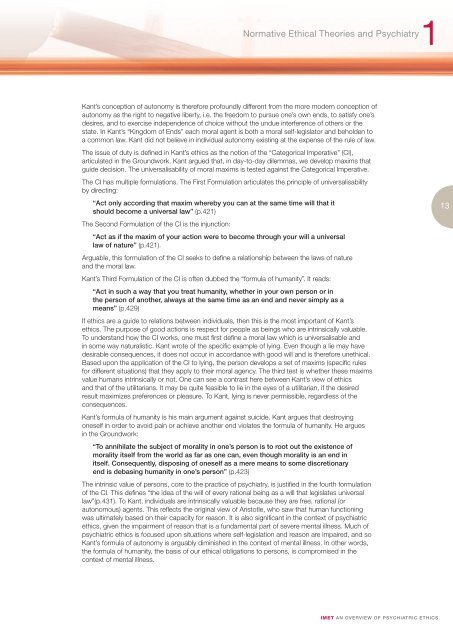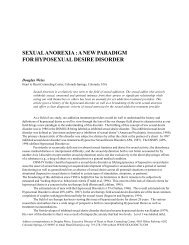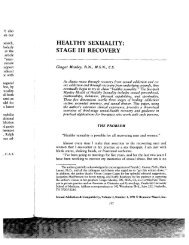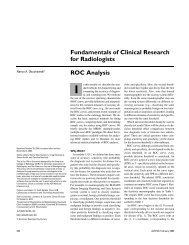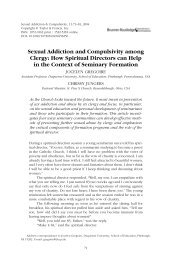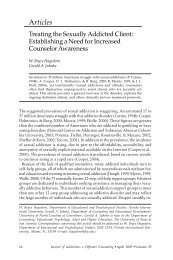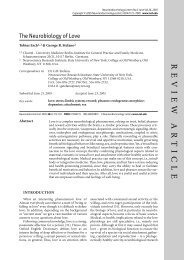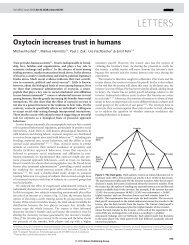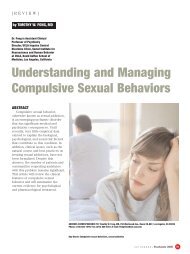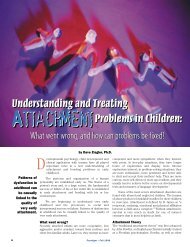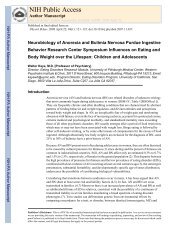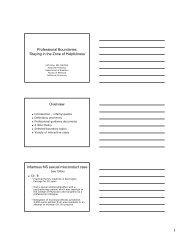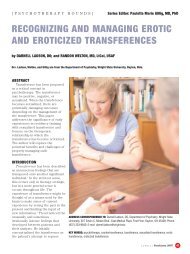It is part <strong>of</strong> a psychiatrist’s responsibilities to attend to the economic aspects <strong>of</strong> treatmentdecisions. 47 The international standard measure <strong>of</strong> utility in this regard is the Disability AdjustedLife Year (DALY) 48 and the Quality Adjusted Life Year (QALY). 49 Singer argued that the use <strong>of</strong> QALYjustified the favouring <strong>of</strong> the preferences <strong>of</strong> those not severely disabled by mental illness, 50 despitethe fact that these are insensitive measures applied to psychiatric disorders. 5112In recent times two factors extraneous to psychiatry, may have promoted utilitarianism’s positionin psychiatric ethics. First, legislated responsibilities <strong>of</strong> psychiatrists, particularly in relation to issues<strong>of</strong> risk <strong>of</strong> harm, have effectively trumped any ethical code <strong>of</strong> conduct intrinsic to the psychiatricpr<strong>of</strong>ession. 52 Such legal imperatives are invariably utilitarian in nature and have usually emergedin the context <strong>of</strong> social and political responses to issues such as public safety. 53, 54 This has led toutilitarian justifications <strong>of</strong> the otherwise vexed ’double agent role’ in regards to forensic patients. 55The other factor promoting utilitarian thinking in psychiatric ethics has been the changes tohealthcare systems in the face <strong>of</strong> globalisation and financial pressures, particularly in the US andAustralia. Indeed, as Dyer has stated, medicine has become a three-way relationship betweendoctor, patient and third-party provider. 7 This issue was given close consideration by Green andBloch, who identified that when applied to mental health care decisions in a managed care setting inthe US, the problem emerged that “maximizing the common good encompasses a central limitation— the indifference to the uniqueness <strong>of</strong> the person”. 56 Green and Bloch go as far as to suggestthat the psychiatrist may be ethically compromised submitting to a market-driven approach in themanagement <strong>of</strong> mental illness.Deontic <strong>Ethics</strong>Introduction“Deontic” refers to duty (from the ancient Greek “déon”, meaning “that which is binding or proper”).The ethics <strong>of</strong> duty, or deontic ethics, are usually attributed to Kant and his later followers. Kant’smoral philosophy is outlined in three main works: Groundwork for the Metaphysics <strong>of</strong> Morals (1785)(‘Groundwork’) 57 ; Critique <strong>of</strong> Practical Reason (1787) 58 ; The Metaphysics <strong>of</strong> Morals (1797). 59 To Kant,the central ethical question was prescriptive – “what ought I do?” Kant’s valuing <strong>of</strong> human reasondictated that the answer to this question had no reference to a conception <strong>of</strong> what was good or theconcept <strong>of</strong> virtue. Kant sought, in essence, principles <strong>of</strong> action which could be adopted by anyonewithout any specificity about desires, circumstances or social relations. In developing a prescriptionfor duties, Kant differentiated between so-called “perfect” duties, which are required <strong>of</strong> all moralagents at all times, and “imperfect duties”. The latter refers to a double negative – not neglectingour duties to others in need.Kant’s <strong>Ethics</strong>Kant’s philosophy is a product <strong>of</strong> the Enlightenment. The “Enlightenment” refers to the periodbeginning in the late Eighteenth Century around the time <strong>of</strong> the French Revolution, in which theprinciples <strong>of</strong> liberty, fraternity and equality challenged the divine right <strong>of</strong> kings and religion to controlsociety. <strong>An</strong> intellectual movement, liberal humanism, evolved in tandem with the political changes<strong>of</strong> the Enlightenment. Liberal humanism (what is now termed “modernism”) was based upon thehuman capacity for rational thought and was characterized by notions <strong>of</strong> absolute truth; that theworld can be controlled and ordered and accurately represented. Enlightenment thinkers believed inordered linear development and the idea that history progressed according to an overall idea, themeor what was later termed by post-modern philosophers “metanarrative”. Kant had proclaimed thatthe motto <strong>of</strong> the Enlightenment was “sapere aud” (dare to know).The two key concepts in Kant’s ethical philosophy are the notions <strong>of</strong> individual autonomy and duty.Kant defined “autonomy” as the capacity for free, rational moral choice – the ability <strong>of</strong> a person t<strong>of</strong>ormulate his or her own laws <strong>of</strong> morality. Kant described this as “practical reason”, in which man isnot beholden to divine commands or superstition, but rather a notion <strong>of</strong> secular morality based uponrational thought. Kant rejected other forms <strong>of</strong> moral action, such as those based upon emotions orfilial bonds. To Kant, the sign <strong>of</strong> a good moral agent is little more than the possession <strong>of</strong> “good will”or dedication to duty. The moral worth <strong>of</strong> an act is its relationship to a good will – not its intentions orconsequences. In other words, deontic ethics can be reduced to the notion <strong>of</strong> doing the right thingfor the right reasons.
Normative Ethical Theories and Psychiatry1Kant’s conception <strong>of</strong> autonomy is therefore pr<strong>of</strong>oundly different from the more modern conception <strong>of</strong>autonomy as the right to negative liberty, i.e. the freedom to pursue one’s own ends, to satisfy one’sdesires, and to exercise independence <strong>of</strong> choice without the undue interference <strong>of</strong> others or thestate. In Kant’s “Kingdom <strong>of</strong> Ends” each moral agent is both a moral self-legislator and beholden toa common law. Kant did not believe in individual autonomy existing at the expense <strong>of</strong> the rule <strong>of</strong> law.The issue <strong>of</strong> duty is defined in Kant’s ethics as the notion <strong>of</strong> the “Categorical Imperative” (CI),articulated in the Groundwork. Kant argued that, in day-to-day dilemmas, we develop maxims thatguide decision. The universalisability <strong>of</strong> moral maxims is tested against the Categorical Imperative.The CI has multiple formulations. The First Formulation articulates the principle <strong>of</strong> universalisabilityby directing:“Act only according that maxim whereby you can at the same time will that itshould become a universal law” (p.421)13The Second Formulation <strong>of</strong> the CI is the injunction:“Act as if the maxim <strong>of</strong> your action were to become through your will a universallaw <strong>of</strong> nature” (p.421).Arguable, this formulation <strong>of</strong> the CI seeks to define a relationship between the laws <strong>of</strong> natureand the moral law.Kant’s Third Formulation <strong>of</strong> the CI is <strong>of</strong>ten dubbed the “formula <strong>of</strong> humanity”. It reads:“Act in such a way that you treat humanity, whether in your own person or inthe person <strong>of</strong> another, always at the same time as an end and never simply as ameans” (p.429)If ethics are a guide to relations between individuals, then this is the most important <strong>of</strong> Kant’sethics. The purpose <strong>of</strong> good actions is respect for people as beings who are intrinsically valuable.To understand how the CI works, one must first define a moral law which is universalisable andin some way naturalistic. Kant wrote <strong>of</strong> the specific example <strong>of</strong> lying. Even though a lie may havedesirable consequences, it does not occur in accordance with good will and is therefore unethical.Based upon the application <strong>of</strong> the CI to lying, the person develops a set <strong>of</strong> maxims (specific rulesfor different situations) that they apply to their moral agency. The third test is whether these maximsvalue humans intrinsically or not. One can see a contrast here between Kant’s view <strong>of</strong> ethicsand that <strong>of</strong> the utilitarians. It may be quite feasible to lie in the eyes <strong>of</strong> a utilitarian, if the desiredresult maximizes preferences or pleasure. To Kant, lying is never permissible, regardless <strong>of</strong> theconsequences.Kant’s formula <strong>of</strong> humanity is his main argument against suicide. Kant argues that destroyingoneself in order to avoid pain or achieve another end violates the formula <strong>of</strong> humanity. He arguesin the Groundwork:“To annihilate the subject <strong>of</strong> morality in one’s person is to root out the existence <strong>of</strong>morality itself from the world as far as one can, even though morality is an end initself. Consequently, disposing <strong>of</strong> oneself as a mere means to some discretionaryend is debasing humanity in one’s person” (p.423)The intrinsic value <strong>of</strong> persons, core to the practice <strong>of</strong> psychiatry, is justified in the fourth formulation<strong>of</strong> the CI. This defines “the idea <strong>of</strong> the will <strong>of</strong> every rational being as a will that legislates universallaw”(p.431). To Kant, individuals are intrinsically valuable because they are free, rational (orautonomous) agents. This reflects the original view <strong>of</strong> Aristotle, who saw that human functioningwas ultimately based on their capacity for reason. It is also significant in the context <strong>of</strong> psychiatricethics, given the impairment <strong>of</strong> reason that is a fundamental part <strong>of</strong> severe mental illness. Much <strong>of</strong>psychiatric ethics is focused upon situations where self-legislation and reason are impaired, and soKant’s formula <strong>of</strong> autonomy is arguably diminished in the context <strong>of</strong> mental illness. In other words,the formula <strong>of</strong> humanity, the basis <strong>of</strong> our ethical obligations to persons, is compromised in thecontext <strong>of</strong> mental illness.IMET AN OVERVIEW OF PSYCHIATRIC ETHICS


